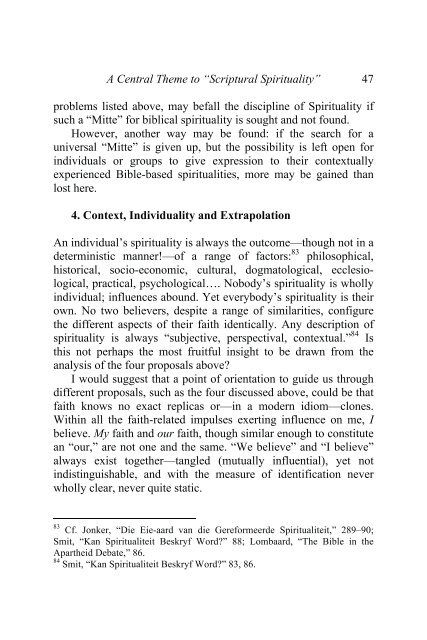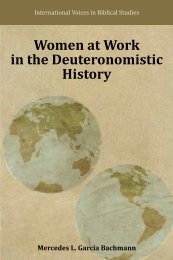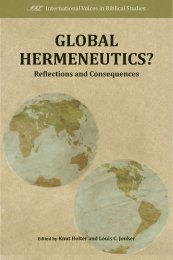The Old Testament and Christian Spirituality - International Voices in ...
The Old Testament and Christian Spirituality - International Voices in ...
The Old Testament and Christian Spirituality - International Voices in ...
Create successful ePaper yourself
Turn your PDF publications into a flip-book with our unique Google optimized e-Paper software.
A Central <strong>The</strong>me to “Scriptural <strong>Spirituality</strong>” 47<br />
problems listed above, may befall the discipl<strong>in</strong>e of <strong>Spirituality</strong> if<br />
such a “Mitte” for biblical spirituality is sought <strong>and</strong> not found.<br />
However, another way may be found: if the search for a<br />
universal “Mitte” is given up, but the possibility is left open for<br />
<strong>in</strong>dividuals or groups to give expression to their contextually<br />
experienced Bible-based spiritualities, more may be ga<strong>in</strong>ed than<br />
lost here.<br />
4. Context, Individuality <strong>and</strong> Extrapolation<br />
An <strong>in</strong>dividual’s spirituality is always the outcome—though not <strong>in</strong> a<br />
determ<strong>in</strong>istic manner!—of a range of factors: 83 philosophical,<br />
historical, socio-economic, cultural, dogmatological, ecclesiological,<br />
practical, psychological…. Nobody’s spirituality is wholly<br />
<strong>in</strong>dividual; <strong>in</strong>fluences abound. Yet everybody’s spirituality is their<br />
own. No two believers, despite a range of similarities, configure<br />
the different aspects of their faith identically. Any description of<br />
spirituality is always “subjective, perspectival, contextual.” 84 Is<br />
this not perhaps the most fruitful <strong>in</strong>sight to be drawn from the<br />
analysis of the four proposals above?<br />
I would suggest that a po<strong>in</strong>t of orientation to guide us through<br />
different proposals, such as the four discussed above, could be that<br />
faith knows no exact replicas or—<strong>in</strong> a modern idiom—clones.<br />
With<strong>in</strong> all the faith-related impulses exert<strong>in</strong>g <strong>in</strong>fluence on me, I<br />
believe. My faith <strong>and</strong> our faith, though similar enough to constitute<br />
an “our,” are not one <strong>and</strong> the same. “We believe” <strong>and</strong> “I believe”<br />
always exist together—tangled (mutually <strong>in</strong>fluential), yet not<br />
<strong>in</strong>dist<strong>in</strong>guishable, <strong>and</strong> with the measure of identification never<br />
wholly clear, never quite static.<br />
83 Cf. Jonker, “Die Eie-aard van die Gereformeerde Spiritualiteit,” 289–90;<br />
Smit, “Kan Spiritualiteit Beskryf Word?” 88; Lombaard, “<strong>The</strong> Bible <strong>in</strong> the<br />
Apartheid Debate,” 86.<br />
84 Smit, “Kan Spiritualiteit Beskryf Word?” 83, 86.




